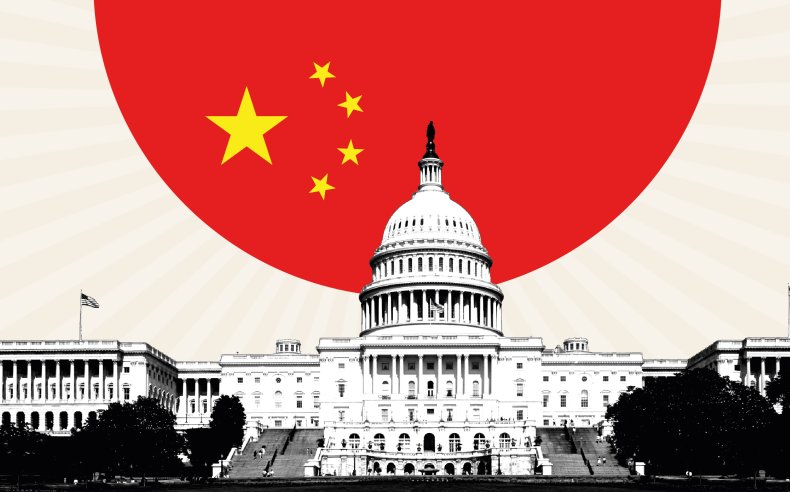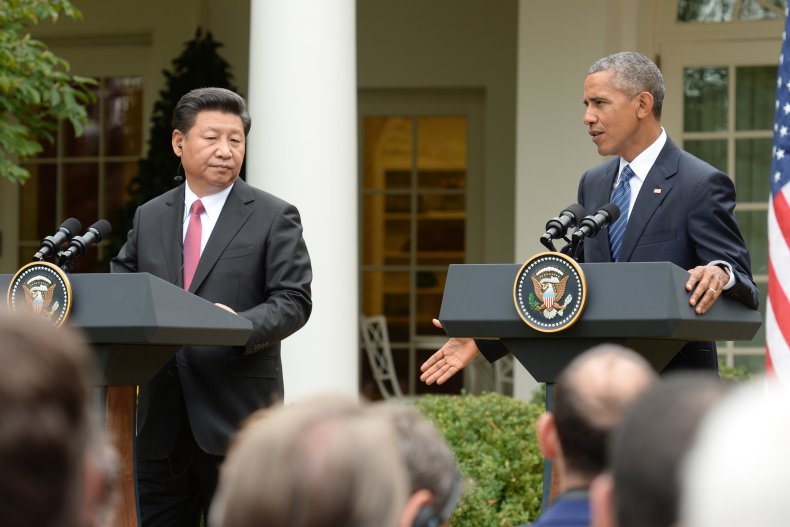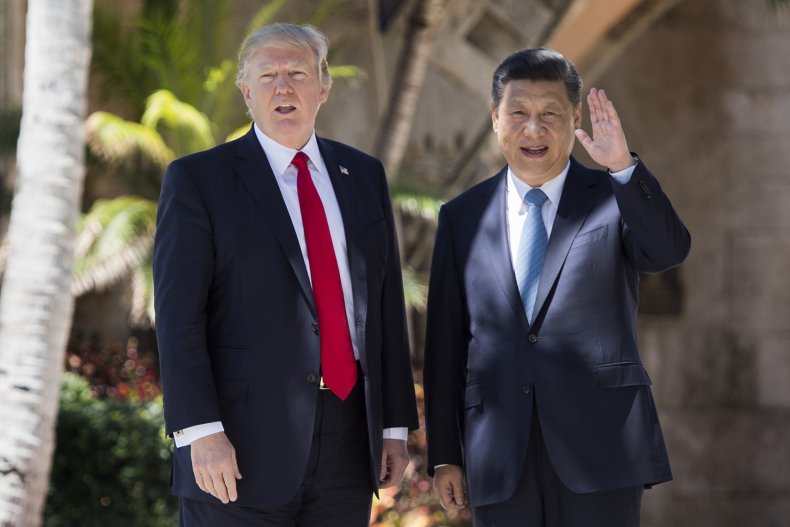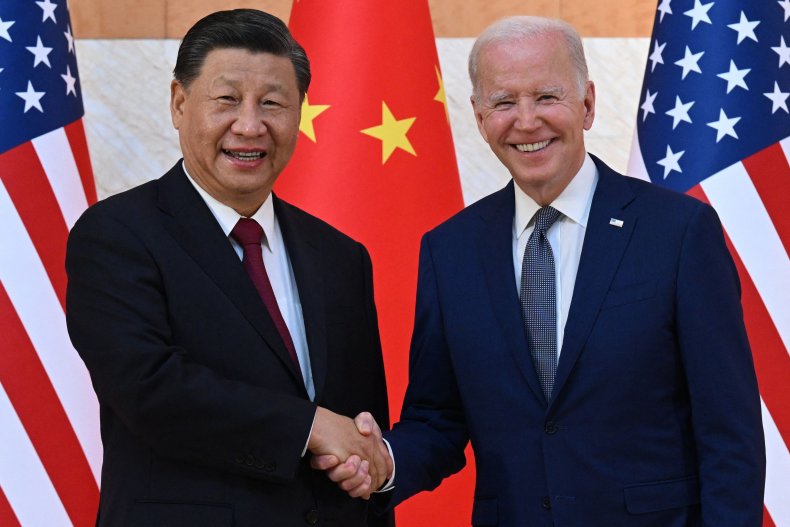- The downing of a Chinese spy balloon has led to heightened scrutiny of espionage efforts under Xi Jinping.
- Not as widely noted has been China's expansion of traditional surveillance capabilities, while its cyber espionage has found success due to poorly secured U.S. networks.
- Beijing has also leveraged members of the Chinese diaspora in America for corporate spying in places of interest.
- The Chinese state security ministry's use of ethnic ties has proved a challenge for Western governments.
- Balancing a watchful posture with an approach that maintains American ideals is key, one expert tells Newsweek.
In the middle of February, a week after an American fighter jet downed China's spy balloon off the Atlantic coast, a diplomat at its foreign ministry sought to turn the fiasco on its head by accusing the United States of launching airships over Chinese territory, too.
After flat denials by seniors U.S. officials, the Chinese spokesperson, who when asked for Beijing's evidence referred reporters to Washington instead, then complained that the Americans had refused to share details of the balloon debris, which was being examined "behind closed doors."
"What gives such an investigation credibility anyway?" he asked, in what was the extent of China's attempt to save face. Beijing's refusal to concede any wrongdoing was par for the course, subject-matter experts said.
In the meantime, the White House must juggle a red-faced adversary with an expectant public when it decides how much to reveal about the recent findings. The information could solve curiosities including the extent to which China relies on its dirigible program for intelligence, surveillance and reconnaissance, as well as how exactly Chinese leader Xi Jinping was convinced of the utility of a balloon with seemingly limited maneuverability.
For many Americans who saw the white orb traverse the country, it was an introduction to brazen Chinese spycraft, and the incident's outcome divided opinion, according to a Newsweek poll commissioned last month.
A majority of U.S. adults thought the balloon was a surveillance platform, but a third believed America was flying airships over China, too. Two-thirds of respondents expressed concern about other high-flying objects over North American airspace, while nearly half said they didn't trust the U.S. government to tell the truth about them, a result that was perhaps difficult to divorce from partisan politics.

In reality, the balloon would've been "more of an afterthought" for China's leaders, said James Lewis, a senior researcher at the Center for Strategic and International Studies and director of its Strategic Technologies Program. "It's been embarrassing for China, and it's made them look silly, so I don't see them expanding it greatly."
However, China is growing its traditional surveillance capabilities, including its ships and aircraft that operate off sensitivity sites around the world. In the U.S., Beijing is suspected of strategically acquiring real estate for signals intelligence. And in space, it controls an array of 260 spy satellites, second only to the U.S., a Pentagon report said last year.
License to Hack
The Chinese government's increasingly sophisticated cyber spying has enjoyed successes in part thanks to the U.S.'s poorly secured networks, Lewis told Newsweek. It has pursued intellectual property theft with impunity, at times with help from human sources, for 20 years, costing American companies billions of dollars.
"They're very adept at hacking, and they've improved remarkably in the last few years. It had been more of a Wild West culture when the PLA was running hacking, because they would hack for personal gain," he said, referring to China's People's Liberation Army. "Xi Jinping has pretty much got that under control. They're very aggressive."
In September 2015, standing outside the White House during Xi's state visit, former President Barack Obama said their two nations had "reached a common understanding" that would put an end to China's "cyber economic espionage for commercial gain."
"We've agreed that neither the U.S. or the Chinese government will conduct or knowingly support cyber-enabled theft of intellectual property, including trade secrets or other confidential business information for commercial advantage," Obama said. "The question now is: Are words followed by actions?"
It was the same press conference where Xi said China didn't intend to militarize the artificial islands it was constructing in the South China Sea.

"Looking back at the history of the Chinese Communist Party, this sort of espionage activity has been at their core. They don't regard our laws as necessarily binding. It's their political culture," according to Lewis, who said the 2015 understanding "barely lasted six months."
"There are implicit signals to tell the other side to back off," he said—closing consulates, expelling diplomats and imposing trade sanctions. "When a country is caught, they never admit it, but they reduce it, at least for a while. The Chinese have not only not reduced the scope, they've increased it. The Chinese aren't getting the hint."
National champions of the People's Republic of China, from telecommunications to aerospace and infrastructure, all have benefited from the illicit acquisition of technology.
"The Chinese have the largest hacking program in the world, by far bigger than every major nation combined. And they've stolen more of our personal corporate data than every nation, big or small, combined," FBI Director Christopher Wray told the Senate Intelligence Committee on March 8.
Avril Haines, the director of national intelligence, cautioned American businesses about the risks of Beijing's forced technology transfer "to boost its indigenous capabilities."
"China has laws that allow them to...basically force those companies to provide information that can be helpful to their intellectual property extension and to ultimately advance their own competitiveness in this area," she said at the same hearing. "And they, through espionage and other means, have also gotten information from our companies even outside of China, and from Western companies, and that in and of itself is an issue."
"The American idea of separating defense and economy—that's not the same to the PRC. They are linked in their minds," said Blake Herzinger, a non-resident fellow at the American Enterprise Institute. "If you have an adversary that doesn't observe that kind of air gap, then their vision is the one that is true."
"Many countries do keep that air gap, because it's a very quick race to the bottom when you have superpowers hacking one another's national champions and key industries," Herzinger told Newsweek. "It's a very dangerous path and it's regrettable."

Obama-era officials now working under President Joe Biden doubtless will remember Xi's short-lived pledge to observe tacit red lines. The administration moved earlier this month to put the U.S. in a more active posture with the release of a national cyber strategy, which shifts cybersecurity responsibilities away from end users to the private sector, with the help of the government.
Industry-wide cybersecurity standards, more secure computer systems and the vetting of cloud service customers are among the proposed rules, according to the new guidelines designed to curb ransomware and other cybercrime.
"Traditionally, governments dealt with cyber espionage by building closed networks for their high side, for national security, defense, intelligence and sensitive government communications. That is increasingly hard to defend because there are so many plug-in points," said Mark Watson, the Australian Strategic Policy Institute's office director in Washington, D.C.
Western governments are now imposing on the private sector "direct obligations, responsibilities and punishments for failure to protect," he told Newsweek. "Such is the risk that governments are wrestling with, they feel they can't leave it to the private sector, and can't even leave it to the private sector to take advice. Now we don't just need carrots, we need sticks."
Human Levers
China's traditional human espionage still occupies minds, according to Watson. At times, Beijing has leveraged members of the Chinese diaspora in America for corporate spying in places of interest. A number of recent high-profile cases suggests it's growing in confidence, and it has had successes penetrating parts of the U.S. government.
In 2018, Ron Hansen, a former Defense Intelligence Agency officer from Utah, was arrested en route to Seattle airport and later sentenced to 10 years in federal prison for attempting to deliver classified information to China. The work, in exchange for hundreds of thousands of dollars, was part of the Chinese government's "troubling trend" of recruiting current and former members of the intelligence community, prosecutors said.
An analysis of 160 Chinese espionage cases directed at the U.S. since 2000 found 41 percent involved cyber espionage, according to CSIS. Among the actors, 42 percent were Chinese military or government employees, 32 percent were private Chinese citizens, and 26 percent were non-Chinese actors, "usually U.S. persons recruited by Chinese officials," it said.
A third of the incidents sought to acquire military technology, 51 percent sought commercial technologies, and 16 percent sought U.S. political information.
"The majority of the successful recruitments are Chinese nationals, because they either feel patriotic or they're subjected to coercion because of their family at home," said Lewis of CSIS.
"It's worth noting, because everyone's heard about this the least, the Chinese are not good at recruiting second- or third-generation Chinese Americans. If you're born here, or you live here and go to high school in Sacramento, you're not going to be any easier to recruit than anyone else."

Beijing's cloak-and-dagger operations in North America have slipped into political coercion, or what the Department of Justice calls "transnational repression," the targeted surveillance and harassment—and even kidnapping—of dissidents, activists, religious practitioners and journalists.
The Chinese state security ministry's use of ethnic ties has proved a challenge for Western governments; the spillover into clandestine activity is often hard to identify, and there are no easy answers. In the U.S., the administration also remains mindful not to alienate the 5 million Chinese Americans, among a total 24 million Asian Americans, who are a defining part of the country's multicultural fabric.
"It does call for a very active cyber defense and counterintelligence approach, and it makes it difficult that the PRC wields so much influence through its diaspora," said AEI's Herzinger. "It is difficult for counterintelligence operations to work without also then being made vulnerable to claims of racism. You have to create a policy that is both culturally sensitive and also gets at the real problem."
"We have to create accessible structures for people in vulnerable positions to be able to seek help without feeling like they are going to be targeted or singled out for any kind of punishment or retribution. We have to identify industries of interest to the PRC, update our security clearance procedures and scrutinize people in those key industries. Balancing a watchful posture with something that still maintains American ideals is key."
Do you have a tip on a world news story that Newsweek should be covering? Do you have a question about China? Let us know via worldnews@newsweek.com.








